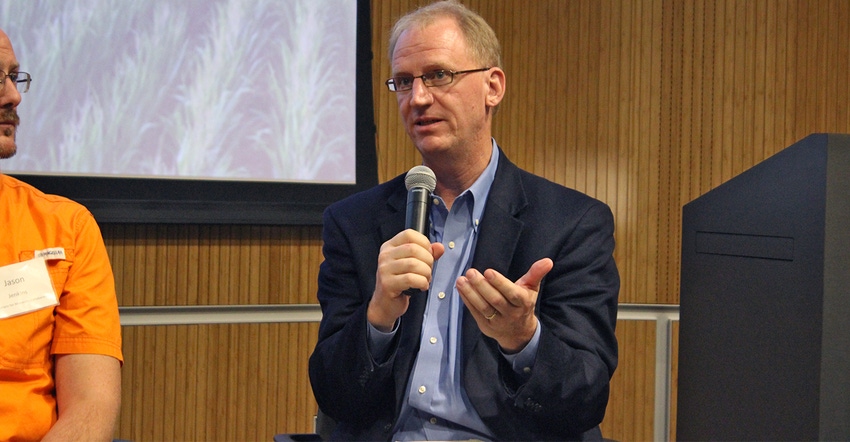
The idea that the National Corn Growers Association would fall in line with the Environmental Defense Fund views seems far-fetched. However, when it comes to soil health, Chris Novak says the two organizations have a common purpose.
Novak, CEO of the National Corn Growers Association, says the time has come for farmers and ranchers to have open dialogues with environmental advocates regarding climate change, soil health and sustainability. "We can fight things out in the courts, we can fight things out in Congress — or we can buckle down, sit down at the table together and talk together about the opportunity for voluntary solution, and we can make real progress for our land and farms at the same time," he says.
Suzy Friedman, senior director of agricultural sustainability for EDF, says that it has been a tough year for agriculture in the environmental arena. "From negative water quality reports that have pointed the finger at agriculture to the largest hypoxic zone in the Gulf of Mexico on record," she says, "it makes it more important that we talk about finding ways that collaboration can move the ball forward on solving environmental challenges and having a vibrant agriculture sector."
So the two organizations forged an unlikely partnership in the areas of soil health, conservation and public perception.
Digging deep
More than three years ago, the NCGA created the Soil Health Partnership. The partnership, a farmer-led initiative, looks at farm management practices that enhance sustainability and farm profitability. It is made up of working farmers from 10 states.
Companies like Monsanto and General Mills were onboard, along with the Walton Family Foundation, the Midwest Row Crop Collaborative and the USDA. However, Novak says his group knew it needed advisers in the environmental community weighing in on the how these practices impact the environment. He reached out to EDF and The Nature Conservancy.
What Novak found was that "when you take the time to sit at the table together, when you can find common purpose, common goal, common interest and get to know people, then you find win-win solutions."
Both Novak and Friedman want those changes to be voluntary, starting at the farmer level.
Making conservation choices
For Novak, farmers working toward sustainability hits home. He grew up on a small 120-acre farm in eastern Iowa, where his dad ran cattle, raised hogs and planted alfalfa, oats, hay, corn and soybeans.
"As I think about voluntary conservation efforts, I think about my dad and the farm I grew up on," he says.
Novak noted that at some juncture, cattle left the farm. When the cattle left, there was no need for alfalfa, so it, too, exited the operation. The hogs stayed until Novak attended college — when access to hog processing plants became limited, and the family left the hog industry.
"His choices were driven by his reality — his economic reality and the environment around him," Novak says.
His father migrated to the typical corn and soybean rotation, but that also posed some problems.
The piece of land was hilly, and keeping the nutrients and water on the crop became a problem. "So once again, my father adapted to change," he recalls. His father went to the local Soil and Water Conservation Service to help him draw up new grass waterways, and he put tile into the field to manage the water runoff. "He made the investment in land, conservation and stewardship — not because he had to, but because he knew it was the right thing to do," Novak adds.
That is why Novak, NCGA and EDF want to make sure that the conservation title in the 2018 Farm Bill remains strong. He says it is time that farmers, conservationists and environmentalists join together to ensure that the resources his father tapped into 40 years ago are still available for the next generation.
EDF can help farmers get local access to technical assistance to make changes on their farm. "What all farmers agree on is, they want to have that conversation with a local conservationist, with a local expert that will incorporate the latest science and technology," Novak says, "The partnership with EDF does that."
Telling the story
NCGA partnered with EDF to promote the stories of farmers and ranchers working together to create environmental changes. The book, "Rancher, Farmer, Fisherman: Conservation Heroes of the American Heartland," by Miriam Horn — lately turned television program on the Discovery Channel — brings farmers and ranchers to the forefront.
It tells stories of conservation methods, like cover crops and precision farming, on two Kansas farms; the success of Montana ranchers in maintaining the environment and natural landscape; and fishermen in the Gulf of Mexico dealing with the complexity of the fishing industry and the environment.
Friedman says this type of storytelling gets to the heart of where agriculture and environment cross. "We need more people telling their story," she says. "This shows how farmers are using technology and management practices to help shape and sustain their farm for the future."
"Agriculture has a real story to tell," Novak says. "With the help of EDF, we are."
About the Author(s)
You May Also Like






